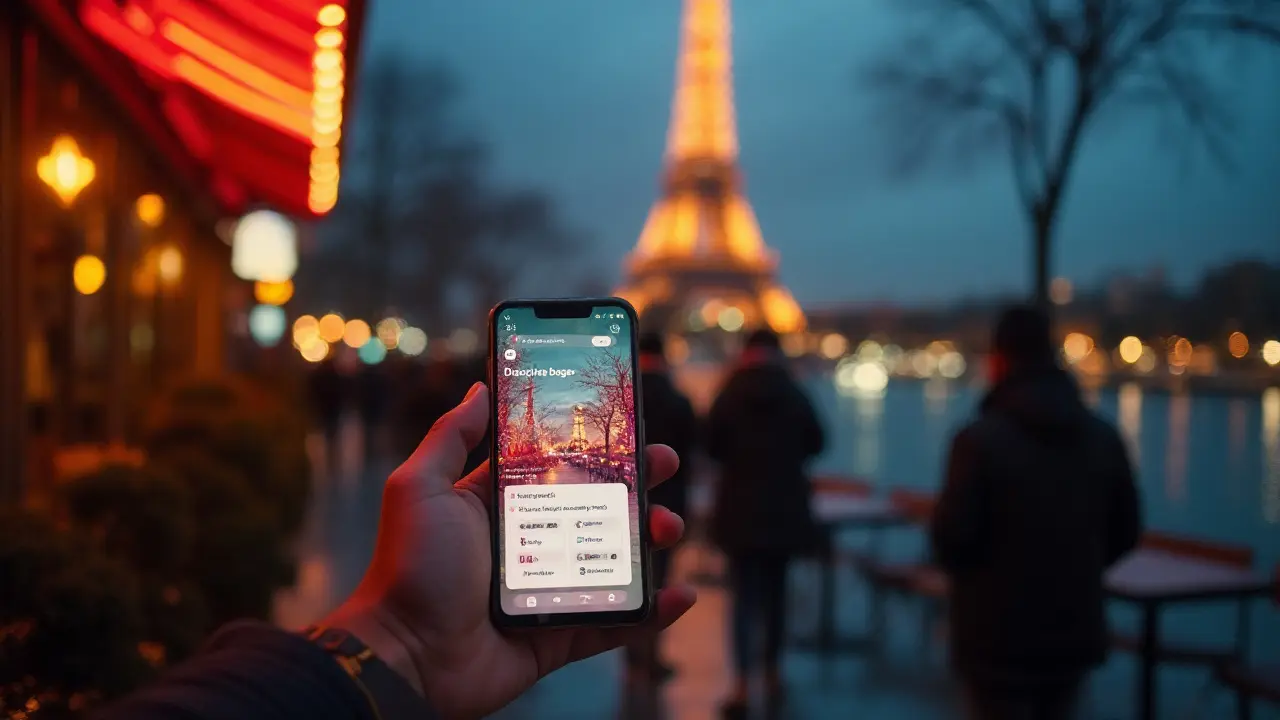Tech rewired the Paris scene more than any new law. Discovery, booking, screening, and safety now happen through apps, encrypted chats, and ID checks-fast when done right, messy when you cut corners. This piece sticks to what actually works in Paris in 2025, what’s risky, and what the rules expect from platforms and users.
- Discovery and booking sit on niche platforms, agency sites, and encrypted messaging; speed and verification win.
- Safety is now a workflow: ID+liveness checks, client screening, check-in timers, and data minimization under GDPR.
- Payments are the pain point: SEPA and cash dominate; cards and crypto are possible but high-friction and high-risk.
- Compliance shapes UX: DSA content rules, PSD2 strong customer authentication, CNIL cookie consent, and retention limits.
- Trends to watch: AI-driven moderation, privacy-first marketing, instant SEPA, and EU digital identity pilots.
How booking moved online in Paris-and what the modern flow looks like
If you want a single mental model, think “mini-marketplace plus private messaging.” Agencies run clean, bilingual sites with booking forms. Independents use no-code builders (Wix, Webflow), directory listings, and a handful of paid ad boards that allow adult services. Discovery often starts on Google or a directory, but the actual conversation moves to encrypted chat fast.
The common 2025 flow in Paris:
- Profile or site visit → clear rates, boundaries, and availability with a visible consent banner (CNIL expects plain language).
- Initial contact → pre-screen questions (age confirmation, preferred time/place) plus a light privacy notice.
- Verification → selfie video or ID check via a third-party verifier, sometimes a small deposit to reduce no-shows.
- Scheduling → calendar link or direct slots; confirmation in chat; code word agreed for safety.
- Day-of check-in → location shared at low precision; arrival notification; optional safety timer running in the background.
Simple beats clever. Fast pages, clear photos with watermarks, two contact options (site form and encrypted app), and a direct FAQ reduce back-and-forth by half. Most agencies also keep an internal CRM: time-stamped notes, screening status, and retention rules so nothing sensitive lingers longer than needed.
What about algorithms? Adult content gets throttled in many channels. Paris operators get better results from steady signals: fast mobile pages, honest titles (FR and EN), clean metadata, and privacy-friendly analytics with events set to capture what matters (contact clicks, form starts, verification passes). Social platforms still remove ads unpredictably; the resilient mix is organic search + directories + return clients + a private mailing list that respects consent.
Localization makes or breaks trust. In Paris, that means 24-hour time, euros, arrondissement names that a local would actually use, and bilingual content that doesn’t read like machine translation. Little cues-short metro references, realistic travel times, and holiday schedules-signal authenticity.
| Area | What changed | Tools used in Paris (2025) | Typical time/cost | Main risks | Compliance anchors |
|---|---|---|---|---|---|
| Discovery | Direct ads shrink; SEO and directories matter more | No-code sites, directories, privacy-safe analytics | Site build: 1-3 days, €200-€1,500 | Shadow bans; fake reviews | DSA content policies; honest descriptions |
| Verification | ID and liveness checks move to standard practice | Third-party KYC, selfie video checks | 30-90 seconds per check; pay-per-verify | Data over-collection; leaks | GDPR minimization, DPIA, retention limits |
| Messaging | Encrypted chat by default | Signal, Telegram; disappearing timers | Setup: minutes; ongoing free | Metadata exposure; screenshots | Lawful basis for storing chat data |
| Payments | Banks de-risk; instant SEPA grows | SEPA transfer, niche processors, cash | Instant SEPA: seconds; fees low | Chargebacks; account freezes | PSD2 SCA; AML reporting by banks |
| Safety | Buddy apps and watchlists standardize | Check-in timers, panic words, shared calendars | Setup: 30-60 minutes | False sense of safety; device theft | Documented safety policy; consent |
| Moderation | More AI filters; clearer escalation paths | Automated plus human review | Appeals: hours to days | Wrongful removals; bias | DSA transparency & notice requirements |
If you remember nothing else about the online side of the escort industry Paris searchers care about: speed, proof you’re real, and a painless way to confirm time and place. Everything else is bonus.
Safety, screening, and privacy: the new non-negotiables
Screening is now a process, not a vibe. Most Paris operators pair a light KYC with a behavioral screen: does the client answer basic questions, accept a deposit or ID match, and respect your communication channel? Two strong signals beat ten weak ones.
Practical tools that get used in 2025:
- Reverse image checks to catch catfishing or stolen images.
- Selfie video with liveness prompts to deter spoofing.
- Disposable email checks and phone reputation lookups to flag spam or abusive patterns.
- Watchlists/bad-date lists maintained privately or via vetted networks. Keep them factual and secure.
- Check-in timers (“I’ll tap done at 22:15”), location share at low precision, and a panic code that flips the plan without creating alarm.
Messaging choices: Signal is the default for a reason-end-to-end encryption and decent controls. Telegram offers reach but more metadata exposure if you don’t lock it down. WhatsApp is common but tied to real identities and backups that may sit in the cloud. Whatever you pick, set disappearing messages for sensitive info, and scrub media metadata. Watermark photos to reduce impersonation.
Device hygiene matters. Separate work and personal phones. Use strong unlock (not face unlock if you may be forced to open your phone), and keep a guest account without sensitive apps. Don’t store IDs or full client notes in your chat app; keep short, coded notes in a password manager with vault sharing if you work in a team.
Privacy isn’t just “be careful”-it’s law. Under GDPR (Regulation (EU) 2016/679), collect only what you need for the stated purpose (screening and booking), store it securely, and delete it when you no longer need it. In practice: define a retention window (for example, delete unbooked inquiries after 30 days, anonymize past bookings after 90 days), and write down the policy. CNIL’s 2024 cookie guidance expects a clean consent banner and an equal “reject all” option on sites.
For ID checks, minimize copies. If a third-party verifier gives you a pass/fail token or a masked ID match, keep that instead of the raw document. If you must store a document briefly, encrypt it and restrict access. Avoid collecting sensitive data that you cannot protect.
Safety tips that actually prevent problems in Paris:
- Use a standard pre-meet script: confirm time, general area, duration, and boundaries. Rehearse it.
- Give a fake but plausible alternative plan with your safety buddy so you can switch without tipping off a risk.
- Don’t share exact location until the last minute; send a landmark first, then the address once the check-in timer starts.
- Track patterns of last-minute reschedules and payment excuses; three strikes, no more bookings.
- Rotate working hours and routes. Paris is compact; predictability is risky.

Payments, banking risk, and the rules that shape the UX
Payments are where tech meets reality. Paris in 2025 runs on SEPA transfers (including instant SEPA), cash, and a shrinking slice of cards via high-risk processors. Traditional processors tighten onboarding and demand extra descriptors for adult services; many simply say no. Expect friction and get in front of it.
How the main options stack up in practice:
- SEPA transfer: cheap, traceable, fast if instant. Good for deposits, but some clients dislike the paper trail. Keep descriptions bland and accurate; let clients use their own wording.
- Cards via niche processors: workable but fragile; chargebacks and surprise freezes happen. If you take cards, use strong customer authentication (PSD2, Directive (EU) 2015/2366) and be upfront about refund and cancellation terms.
- Cash: simple, but plan for security and accounting. Don’t talk evasion; talk safety and recordkeeping with your accountant.
- Crypto: some use it for privacy, but volatility, scams, and AML flags make it a headache. Treat it as a last resort, not a default.
Chargebacks are the silent killer. A short, clear policy (deposits non-refundable after a defined cutoff, one reschedule allowed) reduces disputes. Send a brief confirmation message repeating the terms so you can point to it later. For bigger agencies, a dedicated disputes SOP with templates and time-stamped logs pays for itself.
Banking risk is real in adult work. Keep a clean separation between personal and work accounts. Avoid mixing descriptors that scream “adult.” If a bank asks questions, answer honestly-your bank is bound by AML rules (France’s Tracfin framework), and evasion triggers exits. When possible, diversify: one primary account, one backup, and a plan to route to instant SEPA if a processor blinks.
On the law side, a few anchors shape online operations in Paris:
- French Law 2016-444 (April 13, 2016) penalizes buyers and strengthens support services; pimping and brothels remain illegal. Platforms and ads navigate this by moderating language and forbidding explicit solicitation.
- Digital Services Act (Regulation (EU) 2022/2065) requires platforms to police illegal content, be transparent about takedowns, and offer appeals. If your profile gets removed, you should get a notice with a reason.
- GDPR sits over everything: data minimization, purpose limitation, and user rights to access and erasure. Document how you handle requests.
- PSD2’s Strong Customer Authentication is why some card flows add a 3-D Secure step. Build that time into the booking flow so clients aren’t surprised.
- CNIL’s guidance on cookies (2024) demands real choice and honest purposes. No dark patterns on consent banners.
What about the EU AI Act? Rollout begins this year for the highest-risk areas, but for adult platforms using AI moderation, the key is transparency: say what the filters do, give a way to challenge them, and avoid automated decisions without human review where they affect livelihoods.
Tax and status questions come fast in this space. Don’t guess. The details depend on your exact activities, wording, and contracts. Talk to a French accountant and, if needed, a lawyer who knows the 2016 law and local practice. The tech stack can support clean operations, but only a pro can map it to your situation.
Field playbooks, checklists, and answers for 2025
Booking workflow checklist (Paris-ready)
- Site loads fast on mobile; FR/EN copy; simple rates table; visible consent banner.
- Contact options: form plus one encrypted app. Auto-reply sets expectations (hours, screening, deposit policy).
- Verification: offer ID+liveness or alternative (trusted reference). Store tokens, not raw IDs.
- Calendar: show slots; confirm with a one-line message repeating time, location type, and deposit terms.
- Safety: assign a buddy, set a timer, agree on a code word, keep location share at low precision until arrival.
Client screening checklist
- Ask for age confirmation and a simple history question (have you booked before in Paris?).
- Match name on chat to payment or ID token; reject mismatches politely.
- Look up phone/email reputation; search for exact phrases used across past reports.
- Note behavior cues: evasive answers, rush pressure, refusal of any deposit-mark as high risk.
- Log outcome with a date and retention timer; anonymize later.
Data protection checklist
- Map data you collect (contact info, verification token, chat logs) and why you collect it.
- Set retention: 30 days for unbooked inquiries, 90 days for booked logs unless needed longer for disputes.
- Encrypt storage; limit access by role; switch off indefinite backups for sensitive chats.
- Write a short privacy notice; keep a template response for access/erasure requests.
- Run a DPIA if you use systematic ID checks or centralized watchlists.
Payments risk checklist
- Prefer instant SEPA for deposits; keep card use for exceptions.
- Publish plain cancellation and refund rules; repeat them in chat at booking.
- Keep screenshots of confirmations; export monthly logs for your accountant.
- Maintain a backup bank account and a plan if your processor freezes payouts.
- Don’t hold more data than necessary for payouts and accounting.
Mini-FAQ
- Is online booking “illegal” in Paris? No, but the 2016 law penalizes buyers and bans pimping. Platforms moderate language and remove explicit solicitation. Keep descriptions honest and non-explicit.
- Which messaging app is safest? Signal balances privacy and ease. Use disappearing messages for sensitive info and disable cloud backups.
- Do platforms really need ID? Many do in 2025, for fraud prevention and DSA duties. Ask how they store it, for how long, and whether they can issue a verification token instead of storing the document.
- Are AI content filters reliable? Better than before, still imperfect. Keep a clean version of your profile copy and appeal calmly with specifics when flagged.
- Is crypto the privacy fix? Not really. It adds volatility, scams, and AML attention. Use only if both sides understand the trade-offs.
Next steps and troubleshooting
- My ads keep getting removed: Strip explicit language, focus on logistics and availability, and add a FAQ. Keep a changelog so you know what version gets flagged.
- Payments keep failing: Offer instant SEPA and explain it clearly. If you must use cards, prepare clients for SCA and add a 10-minute hold window.
- A platform asks for invasive data: Request details on storage, retention, and access. Ask for a masked verification token option. Walk if the answers are vague.
- Phone might be compromised: Log out of all sessions, rotate SIM, enable a new device PIN, and move chats to a fresh device. Inform recent clients to ignore suspicious messages.
- Client refuses any screening: Treat it as a no. You’re screening for safety, not status.
- Team scenario (agency): Document your SOPs for screening, safety, data retention, and disputes. Train new staff with role-play. It saves time and reduces risk.
A note on sources and why they matter
For laws and standards referenced here, see: French Law 2016-444 of April 13, 2016; Digital Services Act (Regulation (EU) 2022/2065); GDPR (Regulation (EU) 2016/679); PSD2 (Directive (EU) 2015/2366); CNIL cookie guidance (2024). If you make decisions that affect safety, privacy, or money, read those or speak with a professional. Paris rewards those who do the boring compliance work up front.
Tech won’t make the Paris market easy. It does make it legible. Keep the flows tight, the data light, the safety habits boring, and the money clean. That’s the stack that holds up when something goes wrong.

